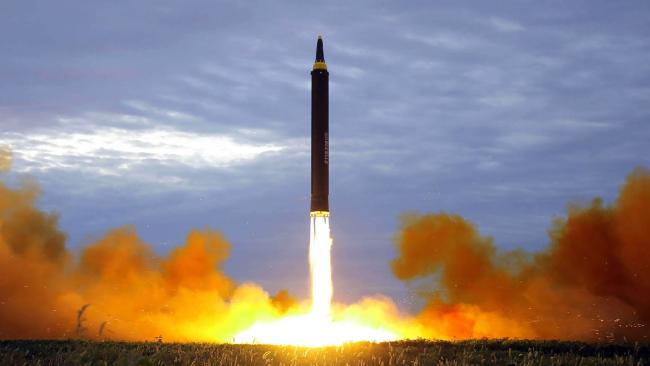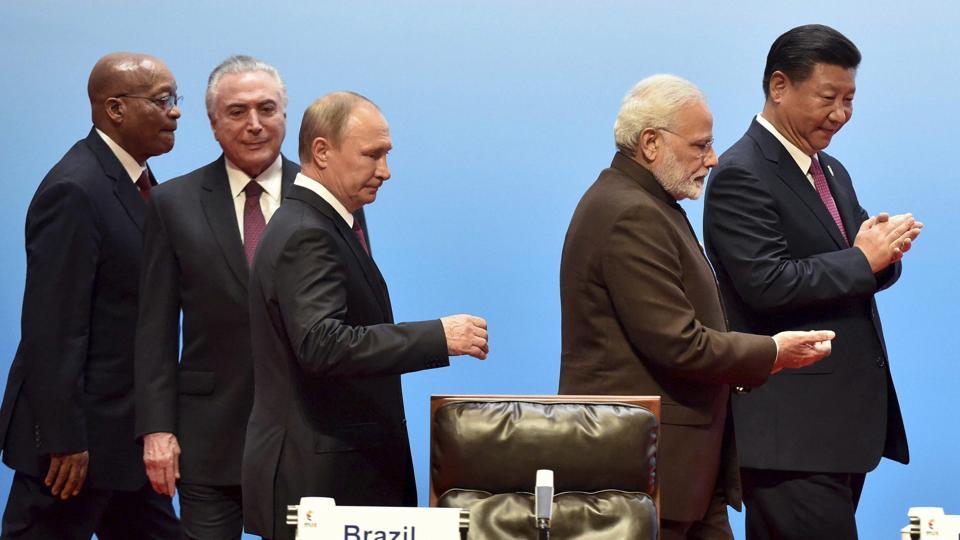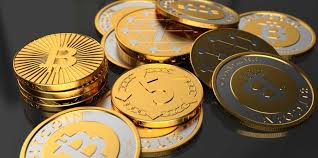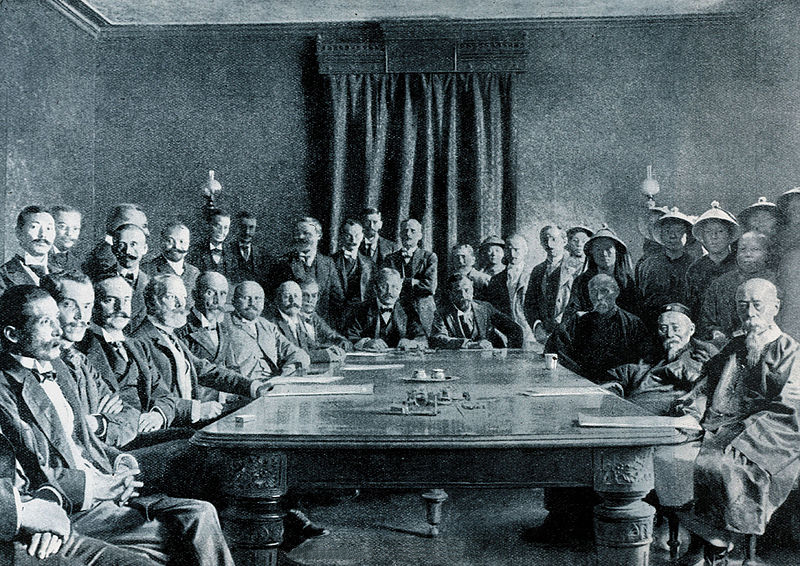
 Did North Korea just test a hydrogen bomb?
Did North Korea just test a hydrogen bomb?Beijing has struggled to hide signs of an about-face in sentiment towards North Korea following claims of a successful Hydrogen bomb test on Sunday.
While some experts suspect that Pyongyang's test may be nothing more than a "boosted" atomic bomb, amplified thermonuclear capabilities represent a potentially-devastating escalation from Kim Jong Un's previous tests. Even an intermediate step towards a full hydrogen bomb - which uses a second stage of reactions to magnify the force of an atomic explosion – demonstrates that North Korea's nuclear program has become more sophisticated. Such capabilities open the door to warheads with more destructive power in smaller spaces.
Some have called the test a "slap in the face" and "poke in the eye" to Pyongyang's sole ally. Much to Beijing's ire, the test also took place during – and by some accounts overshadowed -- the BRICS summit hosted in Xiamen from September 3-5, launching just hours before President Xi Jinping was scheduled to speak.
However, while this episode marks a visible blow to DPRK-China ties, a closer look reveals a steady fraying of ties that extends further back than many western commentators may have recognized. Since Kim Jong Un ordered the execution of his uncle and primary China interlocutor Jang Song Thaek in 2013, ties deteriorated sharply. As a result, Beijing has been cut off from its fair-weather ally's decision-making processes, and, like Washington, fears becoming a subject of Kim's ire.
The precariousness of the China-DPRK relationship has become increasingly apparent in sentiment expressed by the Chinese foreign policy research community – often viewed as one of the few windows into the government's inner thinking. Of late, this group has taken a significantly more hawkish stance towards Pyongyang in newspapers and academic journals across the board. According to The Financial Times, "Gradually this year, voices sympathetic to North Korea have disappeared from newspaper op-eds and academic journals... The debate among these experts is virtually the only public discussion in China of one of the country's biggest foreign policy issues."
Adding to this drumbeat of dissatisfaction towards Pyongyang, the Chinese Foreign Minister on Thursday told reporters that the U.N. should "make a further response and take necessary measures" towards North Korea in light of the new developments, but continued to push for dialogue. However, as North Korea and the U.S. continue to make bogeymen of the other via aggravated Twitter language and mis-translations, it remains to be seen if Beijing's calls for dialogue will be heeded by either side.
 A muted BRICS summit
A muted BRICS summitChina hosted the BRICS Annual Summit was held from September 3-5 in Xiamen, China. The group of emerging economies, Brazil, Russia, India, China, and South Africa, all attended at the head of state level. These economies account for 23% of the global economy, and 16% of global foreign trade.
Ahead of the Summit, Shi Yinhong, an international relations professor at Beijing's Renmin University, speculated that all those tuning in should "expect a muted BRICS summit as participants tread on eggshells to prevent exposing divisions." Brazilian leader Michel Temer and and South African leader Jacob Zuma are both distracted by their own country's' political turmoil, and India and China just defused a standoff on the Doklam border. Christopher Balding, a professor of economics at Peking University, noted "it's really tough to see how BRICS is any type of coherent anything...economically, trade-wise, financially, they all do things very differently. It's difficult to see any room for overlap."
Adding to observations of fragmentation within the economic bloc, Forbes contributor Kenneth Rapoza posited that "China is the one that will gain the most" out of greater cooperation amongst the BRICS. He further cited statistics showing that China's international reserves almost equal the economic output of their four other BRICS counterparts. This led to the conclusion that "China totally owns the BRICS" as "It is clear who is the big buyer and who is staking claim to turf long term."
Despite the lack of apparent cohesion amongst the group, President Xi noted during the summit, the intention of BRICS is not to "move the cheese of anyone," but to "make the pie of the global economy bigger." Further, Xi remarked that BRICS "need to advocate an open world economy, firmly support the multilateral trading regime, oppose protectionism, and rebalance economic globalization to make it more inclusive and equitable." He also stressed a need to "strengthen coordination on positions . . . and provide direction to the multilateral trading regime." Combating the rhetoric that the BRICS group is waning in its cohesion and lacking in its ability to meet Xi's ambition, due to slowed economic growth by many of its members, Xi noted that the BRICS "should promote the 'BRICS Plus' cooperation approach and build an open and diversified network of development partnerships to get more emerging market and developing countries involved in our concerted endeavors for cooperation and mutual benefits."
Amongst the ambitions which Xi wishes to push forward using the "BRICS Plus" approach is global governance reform. To this end, the need for "a more just and equitable international order" was cited in a joint declaration on behalf of the Group. The declaration also addressed a number of other relevant global issues, including the situation with regards to nuclear and ballistic missile tests in North Korea, with the group strongly condemning the rogue county. In a surprising turn of events, the declaration also addressed terrorism, naming a number of Pakistan-based terrorist groups, something which China has historically pushed back against India on in the United Nations Security Council.
Many have pointed to this move by China as a concerted effort to respond to U.S. President Trump's cozying up to India. Back on August 21, 2017, President Trump made an address to the U.S., in which he sought to warm relations between Washington and New Delhi, calling on India to help stabilize Afghanistan.
It remains to be seen whether or not China will continue to court India, and to look at how it affects BRICS. These two factors could have profound impacts on economic and trade relations between the China and US, as well as alter the political dynamics between China and the U.S.
 Cooling-off Initial Coin Offerings
Cooling-off Initial Coin OfferingsOn Monday, the People's Bank of China (PBoC) imposed an immediate ban on all current and upcoming Initial Coin Offerings, or ICOs. For the those readers who have a hard time wrapping their head around blockchain-based currencies, this move basically seeks to put a pause on the largely unregulated market which uses cryptocurrencies to fund new tech startups. The cryptocurrency market in China is massive: In the first six months of this year alone, there were 2.6 billion yuan ($394 million) worth of new virtual currencies. As Caixin notes in this helpful explainer, "The actual size is of the market could be much bigger, as the [government] study did not include sales through private placements."
While in the U.S. celebrities like Paris Hilton and Floyd Mayweather have been joining the ICO craze, China's market is especially active--and rife for scams. Put simply, ICOs function like an initial public offering. Investors are buying a piece of a company and paying for it in crypto-currencies. However, where is gets murkier is when ICOs sell company "tokens" which as Forbes describes, is "digital cash used to purchase products or services only within that company. Either way, these are like investments in virtual worlds. Very few investors really have a handle on them, literally."
While the outright ban of ICOs may seem draconian, many bitcoin investors are speculating that the PBoC is just biding their time to let the market cool off and figure out the proper way to regulate the market. Fortune hypothesizes that China may even be trying to mint their own national cryptocurrency. "If the country succeeds it will have greater control over that platform than the present options (Bitcoin, Ethereum, etc.). Regulators may be clearing the way for this this eventual debut."
In China-US Focus, Andrew Sheng and Xiao Geng write, "The danger of cryptocurrencies extends beyond facilitation of illegal activities. Like conventional currencies, cryptocurrencies have no intrinsic value. But, unlike official money, they also have no corresponding liability, meaning that there is no institution like a central bank with a vested interest in sustaining their value" Still don't know what the big fuss is? This video from Tech in Asia is informative.
 This Week in Chinese HistoryOn September 7, 1901, The Peace of Peking was signed, ending the Boxer Rebellion in China. Also known as the Boxer Protocol, it was signed between the Qing Empire of China and the Eight-Nation Alliance that had provided military forces (Austria-Hungary, France, Germany, Italy, Japan, Russia, the United Kingdom, and the United States), plus Belgium, Spain and the Netherlands. The Boxer Rebellion, Boxer Uprising or Yihetuan Movement was a violent anti-foreign, anti-colonial, and anti-Christian uprising that took place in China between 1899 and 1901, towards the end of the Qing dynasty. It was initiated by the Militia United in Righteousness (Yihetuan), known in English as the "Boxers", for many of their members had been practitioners of the martial arts, such as boxing. They were motivated by proto-nationalist sentiments and opposition to Western colonialism and associated Christian missionary activity. The uprising took place against a background of severe drought and the disruption caused by the growth of foreign spheres of influence. After several months of growing violence against both the foreign and Christian presence in Shandong and the North China plain in June 1900, Boxer fighters, convinced they were invulnerable to foreign weapons, converged on Beijing with the slogan "Support the Qing government and exterminate the foreigners." After the capture of Peking by the foreign armies, some of Empress Dowager Cixi's advisers advocated that the war be carried on, arguing that China could have defeated the foreigners as it was disloyal and traitorous people within China who allowed Beijing and Tianjin to be captured by the Allies, and that the interior of China was impenetrable. They also recommended that Dong Fuxiang continue fighting. The Empress Dowager decided, however, that the terms were generous enough for her to acquiesce when she was assured of her continued reign after the war and that China would not be forced to cede any territory.
This Week in Chinese HistoryOn September 7, 1901, The Peace of Peking was signed, ending the Boxer Rebellion in China. Also known as the Boxer Protocol, it was signed between the Qing Empire of China and the Eight-Nation Alliance that had provided military forces (Austria-Hungary, France, Germany, Italy, Japan, Russia, the United Kingdom, and the United States), plus Belgium, Spain and the Netherlands. The Boxer Rebellion, Boxer Uprising or Yihetuan Movement was a violent anti-foreign, anti-colonial, and anti-Christian uprising that took place in China between 1899 and 1901, towards the end of the Qing dynasty. It was initiated by the Militia United in Righteousness (Yihetuan), known in English as the "Boxers", for many of their members had been practitioners of the martial arts, such as boxing. They were motivated by proto-nationalist sentiments and opposition to Western colonialism and associated Christian missionary activity. The uprising took place against a background of severe drought and the disruption caused by the growth of foreign spheres of influence. After several months of growing violence against both the foreign and Christian presence in Shandong and the North China plain in June 1900, Boxer fighters, convinced they were invulnerable to foreign weapons, converged on Beijing with the slogan "Support the Qing government and exterminate the foreigners." After the capture of Peking by the foreign armies, some of Empress Dowager Cixi's advisers advocated that the war be carried on, arguing that China could have defeated the foreigners as it was disloyal and traitorous people within China who allowed Beijing and Tianjin to be captured by the Allies, and that the interior of China was impenetrable. They also recommended that Dong Fuxiang continue fighting. The Empress Dowager decided, however, that the terms were generous enough for her to acquiesce when she was assured of her continued reign after the war and that China would not be forced to cede any territory.
Prepared by China-US Focus editorial teams in Hong Kong and New York, this weekly newsletter offers you snap shots of latest trends and developments emerging from China every week, while adding a dose of historical perspective.
- 2017-09-01 Are Forced Technology Transfers Forcing the U.S. and China to Rethink How They Do Business?
- 2017-08-25 Bannon Out: What now for the China-US relationship?
- 2017-08-18 Trump Launches “Investigation on Whether to Investigate” China’s IP Laws
- 2017-08-11 Threats of "Fire and Fury" on the Korean Peninsula
- 2017-08-04 Trump Administration Plans Trade Actions Against China
- 2017-07-28 Xi to Dominate the 19th CPC Congress
- 2017-07-21 A Steely Comprehensive Economic Dialogue
- 2017-07-14 South China Sea Arbitral Award after One Year
- 2017-07-07 Now is the Trump Honeymoon with China Over?
- 2017-06-30 China Passes New Intelligence Law
- 2017-06-23 The End of China’s Honeymoon with Trump & Diplomatic and Security Dialogue
- 2017-06-16 Climate Change and Reliable Data Dealt Blows
- 2017-06-09 India, Pakistan formally welcomed into the Shanghai Cooperation Organization
- 2017-06-02 Once Partners in Fighting Climate Change, Trump Retreats, China Stays Steady on Paris Climate Accord
- 2017-05-26 Chinese Missile Frigates Confronts USS Dewey as U.S. Resumes FON Operations in South China Sea
- 2017-05-19 The Belt and Road Forum Concludes Leaving Behind Mixed Reactions
- 2017-05-12 Beijing, Washington Reach First Trade Deal Under 100-day Plan
- 2017-05-05 Degree of Autonomy Decaying in Hong Kong?
- 2017-04-28 Aircraft Carriers, Submarines, and Jetliners: Now Made in China
- 2017-04-21 Green Cards & Red Lines